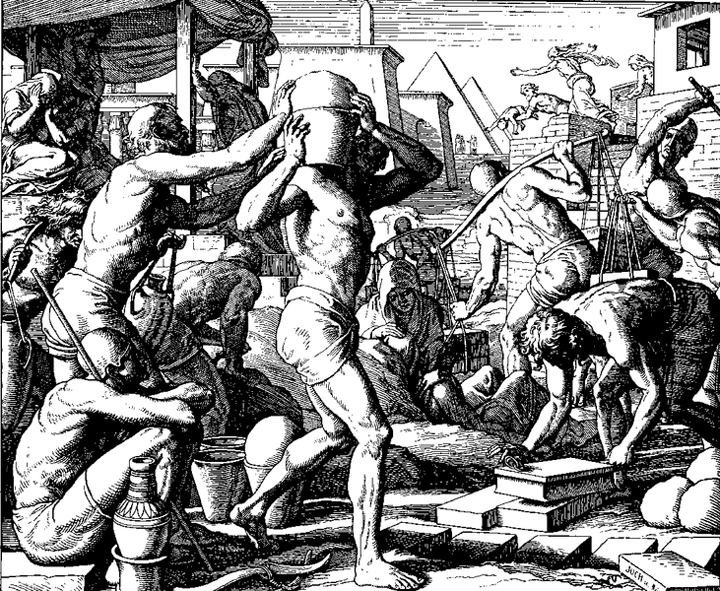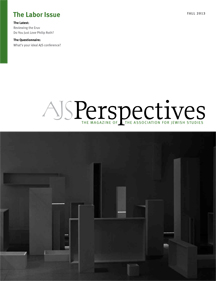
The fool folds his hands
eating his flesh.
Better is a spoonful of calm
Than two cupped hands of anxiety—
feeding wind (Kohelet 4:5–6).
One imagines Kohelet (the speaker in Ecclesiastes—already figured as a Solomon in disguise by the writer) collecting proverbs and making glosses in the margins of his memory. Later, he polishes the peoples’ sayings into poems. As he composes the scroll, he takes apart the mnemonic armature in order to recall his own observations: “Then I saw that all toil and all skill in work come from one person’s envy of another. This also is vanity and a chasing after wind!” (Kohelet 4:4). Here the Hebrew grammar doubly marks the first person: Kohelet stresses his own exasperation at the “Aha!” moment. Does the raw emotion come from the discarded notes of Kohelet’s proverb collection? Does embedding a song lyric (“Better a spoonful”) popularize what’s learned, the singer finding a bald conclusion insufficient? Kohelet, the teacher, follows the path of Solomon, composing and collecting songs and proverbs as part of his scholarly, pedagogical project. After all, didn’t such songs—Moses’s and Miriam’s victory song, Deborah’s mocking song, David’s lament for Saul and Jonathan—teach well?
I suppose one could reduce the writer’s sentiments to nihil nimus, “nothing in excess,” noting something about the “middle way” or “golden mean.” But then one loses all the “pleasures of the text” including wordplay about hands, hollow-of-hand, and handfuls (yadayim, kaf, (hofnayim), the tension between the contrasted realms of basar (flesh/meat/food) and ruah (wind/spirit), the wordplay on ‘amal (toil; anxiety) and its contrast to nah at (calm; patience). The words of the sage cannot quite be nailed down (Kohelet 12:11).
The self-described “son of David, king in Jerusalem” hates toil. His thought-experiment—following two others concerning pleasure and wisdom—diagnoses work’s futility. He may leave the fruit of work to someone foolish, or leave it to someone who didn’t work at all. What are his wages? Vexation, pain, and sleepless nights, because his mind takes no rest. If he were wicked, his gathered fruits and heaped-up grain could go to the righteous! His prescription? “There is nothing better for mortals than to eat and drink, and find enjoyment in their toil.”
Kohelet extends his scope to observe work’s sorrows in finer detail. Besides the toil of envy, he imagines the wretched toil of the oppressed and the burdensome labors of oppressors. The dead are happier than the living because they don’t have to further endure misery.
A solitary worker amasses wealth while denying himself. For whom does he work? A lover of money is never satiated. In Kohelet’s imagined autobiography, “I multiplied my possessions . . . built myself houses . . . planted vineyards . . . laid out gardens and groves . . . [and] constructed pools of water.” Having launched all sorts of projects, his wealth piles up—but so do the “eaters” who consume it. For the wealth manager, what good is the result if it only delights her eyes but does not satisfy her cravings? “The eyes are not satisfied by seeing.” All human toil is for the mouth—he argues—“yet the gullet is not sated.” Satisfaction is a moving target.
To treat the work-related illnesses diagnosed above (let’s call them the “pain-of-the-whip” and the “burden-of-oppressing,” workaholism, “achievement-disaffection,” and “survival-struggle fatigue”), Kohelet prescribes companionship. “Two are better off than one,” not only because they have more earnings, but also “should they fall, one can raise the other.” In contrast, “Woe to the one who is alone and falls.” If companionship is a consolation that adds to the enjoyment of food and makes work more of a joy, then, Kohelet adds, sleep can operate similarly for the workaday laborer.
I ask my companion, “What is your theory of labor?” He answers, “Get it over as
quick as possible.”
In an interview with Paul Rabinow Foucault discussed his notion of an “archaeology of thought.” In historical linguistics the words and grammar of existing languages enable the envisioning of a “proto-language”: known rules of language change make a linguistic archaeology possible. One can conduct a similar archaeology of ideas. For example, one can take the “data” of Kohelet as an ancient “solution” to a felt “problem” and compare it with other material from narratives or law that enfold multiple, even conflicting, “solutions.” From these one can triangulate a hypothetical problem that various biblical writers confront. The “archaeology of thought,” as I understand it, suggests that felt discomfort pushes a problem into consciousness; the problem mulled over engenders a question; and the question leads to attempted (textual) solutions. As a method, it offers a way of discovering what is under the surface of ancient texts.
The writer of Kohelet may be reacting to a folk tradition that centers on the bad and good habits of workers. The so-called Pious Digest or “Proverbs of Solomon” (Proverbs 10:1–22:16) gives us a proverb-a-day for consideration. Among the 182 for the second half of the year one finds: “The appetite of a laborer labors for him/ Because his hunger forces him on” and “In winter the lazy man does not plow/ At harvesttime he seeks and finds nothing.” On the other hand, “The Words of the Wise” (Proverbs 22:17–24:22), which reworks the thirty proverbs of the Egyptian Instruction of Amen-em-opet, commends the skilled worker but recommends that he not toil for wealth because it is prone to disappear. “The Words of King Lemuel” (Proverbs 31), a non-Israelite collection attributed to a woman, praises the extraordinary patriarchy-serving labors of the righteous woman, ’eshet hayil. But, in contrast with such proverbs, Kohelet uses the proverb form to argue that the accumulation of wealth—the surplus value of labor (if I can borrow from Marx)—causes anxiety, problems with heirs, trouble with workers. For the workers, work causes the loss of their labor product. The question, implicit in these wisdom texts, shifts from “What’s right with work?” to “What’s wrong with it?” How can this be fixed? Kohelet advises readers to take the small everyday rewards and not become overinvested. This is not the Protestant work ethic that Weber and others claimed to identify in the Hebrew Bible.
Biblical narratives offer different answers and a larger context for Kohelet: Divine work counts as both “good” and “very good” and concludes with rest. Human work, however, is cursed, hindered by pain, thorns, and thistles. “By the sweat of your brow shall you get bread to eat.” Jacob worked seven years for Rachel “and they seemed to him but a few days,” while Pharaoh “ruthlessly imposed upon the Israelites . . . harsh labor at mortar and bricks.” Questions—“Why must I work?” and “Is work good?”—are implied by the narratives’ competing answers:
God ordains and curses work; work to eat; punctuate work with rest; love a companion to distract from work’s pains; if those pains are life-threateningly bitter, resist. If we follow Foucault that something must have made a behavior—work—“uncertain” and provoked difficulties, then the questions betray the fact that work is difficult, causes discomfort, and that its absence endangers life itself. Thought, then, “develops a given into a question” and transforms “difficulties into problems” resulting in diverse cultural solutions.
Ancient legal texts in the cultural world of the Hebrew Bible form a third solution set. Though the Sumerian Laws of Ur-Namma (ca. 2100 BCE, Ur) and the Code of Hammurabi (ca. 1750 BCE, Babylon) make personal injuries torts, what about work-related injuries? Hittite laws (ca. 1650–1500 BCE, Anatolia) view all injuries as compensable both in the case of slaves and free people (Laws 8–12). The biblical Covenant Code (ca. early first millennium BCE) requires damages from the slave owner or “employer” who injures the slaveworker: “When a man strikes the eye of his slave . . . he shall let him go free on account of his eye” (Exodus 21:26). Generously construed, this is a forerunner of the late-nineteenth century move in Prussia to enact employer liability laws that eventually gave way to workers’ compensation.
Otto von Bismarck, in his struggle with Prussian Marxists and socialists, pushed for the Employer Liability Law in 1871, which initiated limited worker protections in select industries. But in 1884 Bismarck’s Workers’ Accident Insurance extended coverage to create the first modern workers’ compensation no-fault system. The older act required that workers prove employer negligence; the newer did not. In 1911 Wisconsin passed the first comprehensive law in the United States. By the time Mississippi passed its Workers’ Compensation Law in 1948, employers in the US also had legislative incentives to rehabilitate the injured worker.
Returning to the work legislation of ancient legal texts, Hammurabi set wage scales for certain work, a move that may or may not have protected workers. But both the biblical Holiness Code (Leviticus 9:13) and Deuteronomic Code (Deuteronomy 24:15) call for immediate payment of wages. The Hebrew slave is to be given wages upon release (Deuteronomy 15:13–14). The straitened kinsman who sells himself into slavery must be treated as a hired laborer, not subject to ruthless treatment (Leviticus 25:39–40, 43). Even the ox is not to be muzzled while threshing. If laboring animals are allowed to feed, then workers must be able to eat. If slaves gain rights to fair treatment, compensation for injury, and wages then, kal va-homer, so do the free. Thus when the Decalogue commands weekly rest from work for animals, resident aliens, male and female slaves, and kin, they shall “rest as you do.”
These legal gestures toward reducing work’s bitterness prepare one to triangulate the cultural problem. What question might stand behind the solutions negotiated in various textual layers of biblical wisdom literature, narrative, and law that trace a history of ideas? Laboring is neither idealized in Kohelet, nor rejected as without benefit. In light of the tensions between divine declarations, actual work-life experience, and work’s inexorable necessity, “How should we then work?”

